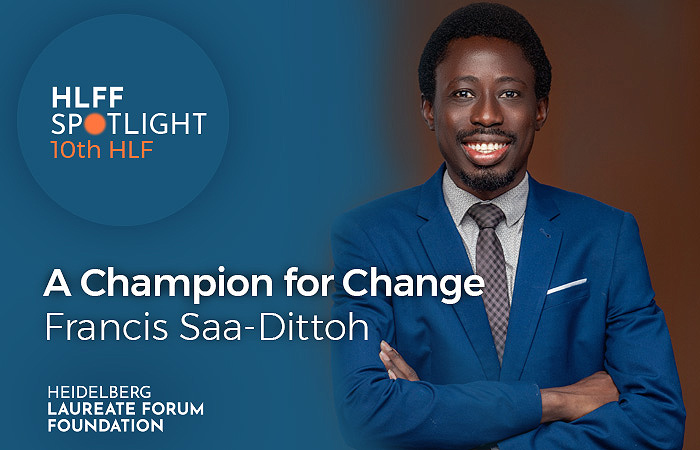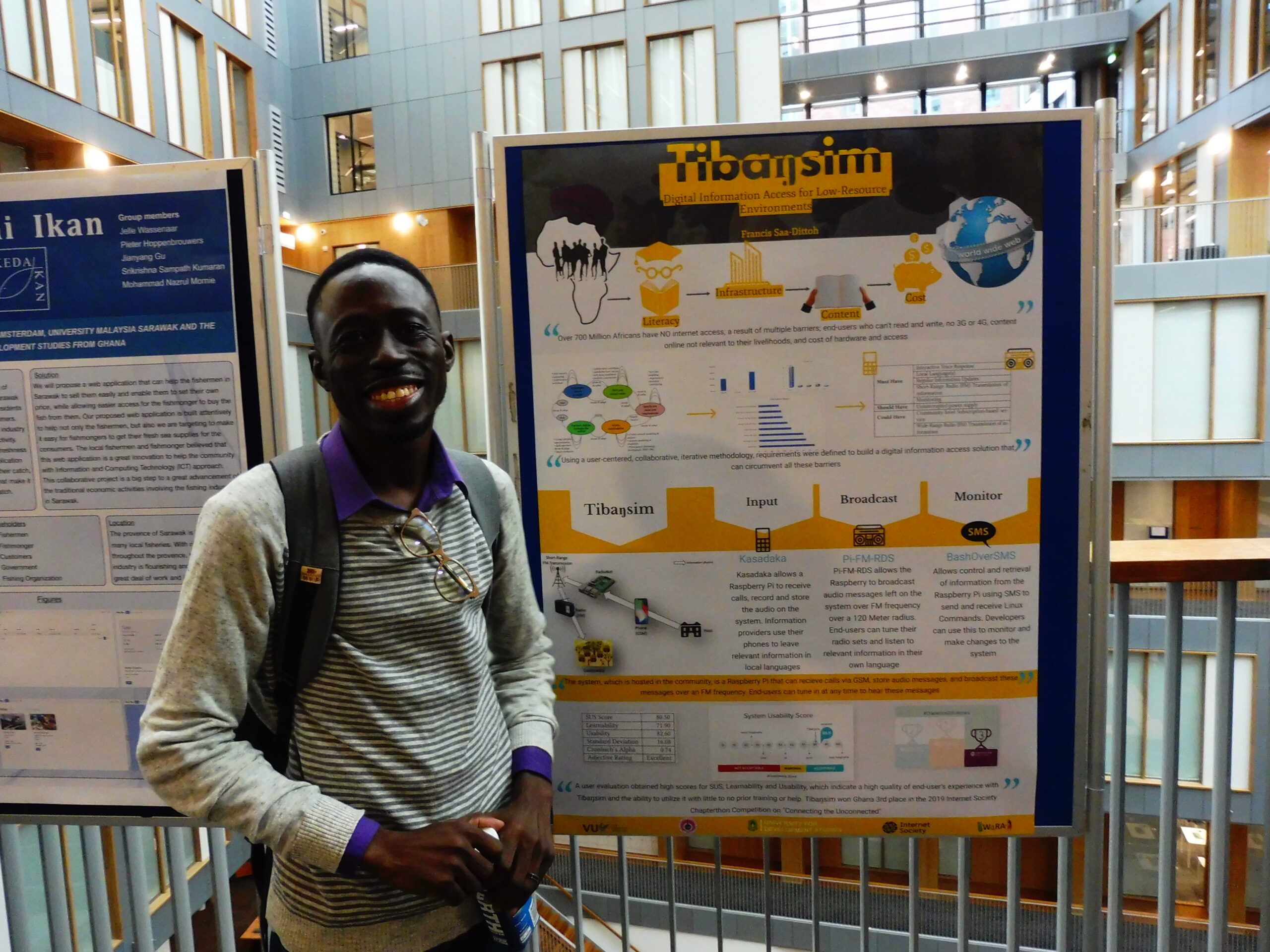HLFF Spotlight: 10th HLF
BLOG: Heidelberg Laureate Forum

A Champion for Change – Francis Saa-Dittoh
The Heidelberg Laureate Forum has a single purpose: To provide some of the brightest minds in mathematics and computer science with the space and time to make connections and find inspiration. The HLFF Spotlight series shines a light on some of the brilliant young researchers attending the event, their background and research, as well as their expectations for the HLF.

Ghanaian PhD student Francis Saa-Dittoh is a ferocious reader of sci-fi books. His reading habits have taught him that technology-wise almost anything imaginable is possible. However, his practical involvement in the field of information and communication technology for development (ICT4D) has taught him that what is possible isn’t always appropriate. He therefore believes that those designing technological options to solve some of the world’s pressing developmental issues must always take note of the needs, abilities, and resources of the communities they aim to serve and support.
“Too many projects have failed because people have not followed this simple rule,” notes the 41-year-old Francis, who works part-time on a PhD in Computer Science, with a specific focus on ICT4D, through the Vrije Universiteit Amsterdam in the Netherlands.
“If a community, for instance, generally uses mobile phones to make voice calls, it doesn’t help to develop apps for smartphones that need a good internet connection. It will fail,” he says by way of example.
Career Path
As early as primary school, Francis knew that the IT world would be his future. He encountered his first computer in his father’s university office. He used the opportunity of subsequent visits to teach himself the basics of programming, with the help of whatever manual was at hand. He has since become the go-to IT guy for his family and friends.
After school, Francis completed a BSc degree in Computer Science in 2006 at the Kwame Nkrumah University of Science and Technology in Ghana. One of his undergraduate projects saw him co-design a 3D game with Eyram Tawia of the Ghanaian gaming studio Leti Games. A gaming historian later listed it as the first of its kind in Africa.
Earlier this year, Francis was appointed as a lecturer in the new Department of Computer Science at the University for Development Studies (UDS) in the Northern Region province of Ghana. In this role, he has helped develop a new BSc curriculum that introduces students to core concepts around ICT4D.
“UDS is one of the first African universities to have such a course,” Francis notes.
His relationship with UDS stretches back to 2007, when he was hired as an IT specialist. He has since supported the endeavours of many research groups in some way involved in developmental work – be it in agriculture, education, medicine, or ICT.
Ghana’s northern provinces are recognized as some of the least developed areas in this West African country of 34 million people.
“The average literacy rate for Ghana is well over 80%, but in the northern parts, where UDS is situated, this drops to around 32%,” he explains. “A lot still needs to be done to bring the rural areas in the north closer to the national norm.”

ICT Research
Francis’ own formal foray into the world of ICT research came through his completion of a MSc in Computer Science (Internet & Web Technologies) through the Web Alliance for Regreening Africa research group at the Vrije Universiteit Amsterdam in the Netherlands in 2013. He is now working within the same research group on his PhD. He is investigating digital information access for resource-constrained environments.
He is currently the principal investigator of the TIBaLLi (which means “our language” in Dagbani) Project. The effort uses artificial intelligence (AI) and machine learning to bring locally relevant information about farming practices, weather conditions, commodity prices and such to local communities. It also forms part of efforts to “decolonize the internet” as the aim is to provide locally relevant information in terms of its contents as well as the technology and languages used.
According to Francis, such work is needed, as many local Ghanaian languages are so small that they rarely feature on the priority list of major software companies’ computerized translation services.
The TIBaLLi Project will provide pre-recorded local content information to rural communities speaking the Dagbani language in the semi-arid Sahel region of northern Ghana. Pre-recorded local radio broadcasts are used, because community members in this isolated area have ready access to radios. Interaction with the system by farmers in these rural communities will be achieved using AI (and Natural Language Processing in particular) as well as a domain-focused speech vocabulary. The latter has already been crowd-sourced among Dagbani speakers as part of TIBaLLi’s experimental field work.
“Electronic delivery of solid information in speech and local language to communities beyond the current boundaries of the internet is new. This project will point to internet information beyond the current internet,” he explained in a recent article about TIBaLLi on the website Perspectives on ICT4d.org.
In it, he pointed out that the internet is not always the most important or appropriate vehicle through which to solve the so-called “digital divide” of the Global South. Issues of language and the relevance of content must be addressed.
Earlier this year, the TIBaLLi project received a $100,000 research grant from the Internet Society Foundation as part of efforts to decolonize the internet. He is partnering with colleagues from UDS, the Internet Society Ghana Chapter and Vrije Universiteit Amsterdam.
“I wouldn’t call myself a language activist, although I have in recent months learnt a lot about language issues through this project. I’d rather call myself an ICT4D champion for change,” says Francis, who speaks English, his mother tongue of Frafra, and a bit of Twi, Dagbani, and Dutch.

Francis’ first practical foray in ICT4D work began in 2019 through two Development of Information Access System projects. One called Mr. Meteo was a voice-based weather forecasting system. Users made Global System for Mobile Communication (GSM) voice calls to the system to receive information. Another, named Tibaηsim (originally called RadioNet), broadcast information from a low-cost Raspberry Pi computer over FM frequencies. It came third in the Internet Society’s international Chapterthon Competition in 2019, after teams from the USA and South Africa.
He acknowledges that he learnt many of his most valuable lessons about community engagement and information sharing from his father. Prof. Joseph Saa Dittoh, also at UDS, is widely recognized for his work in agricultural development.
IT Entrepreneur
Francis is a music lover who composes and performs gospel songs. Therefore, it’s no wonder that he would also use his IT prowess to further the work of Ghanaian authors and musicians through his involvement in developing two apps, Woom and Sefarim.
Woom is a customized mobile music app that will deliver Ghanaian music to music lovers. A Beta version of Sefarim is already available on the Google Play Store. It is a customized Android-based provider of eBooks by local Ghanaian authors.
“We are working on these apps because too often local content is drowned out by international voices. It makes it difficult to find Ghanaian authors and musicians on the web,” he explains.
He has previously provided IT services to help develop a website and databases in a United Nations Development Programme project, UNDP/GEF CLME+, to help manage the Caribbean and North Brazil Shelf Large Marine Ecosystems. On the business side, he helped to build a Ghanaian e-commerce site, Hypestore. Currently he is developing Python-based financial processing modules for a Dutch firm.
Francis, who also serves as a pastor in his local church, clearly likes keeping busy.
About the many projects that he has on the go, he just smiles: “My wife and mother may tell you there’s too many, but I’m always up for a challenge.”
The 10th HLF
It’s no wonder that Francis is looking forward to the upcoming 10th Heidelberg Laureate Forum – from meeting other researchers in his field and enjoying the social events to gaining insights about his field from this year’s laureates.
“There is always an eye-opening dimension to hearing their insights rather than just reading about them,” Francis notes. “I’d like to pick Raj Reddy’s brain about the potential use of artificial intelligence in resource-constrained areas of the world and gain insights from Vinton Gray Cerf on how the (re)design of hardware and software protocols can influence the decolonization of the internet.”


Dies ist, aus aufklärerischer Sicht sozusagen, korrekt. [1]
Hierzu :
Es ging hier nicht um “Dekolinisisation”, sondern zusammen mit dem Protokoll “TCP/IP”, sondern um Ausfallsicherheit, wenn Stationen eben ausfallen, auch kriegerisch, um dennoch eine Stabilität im Angriffs- oder Verteidigungsfall zu erhalten.
“TCP/IP” ist ein Produkt möglicher Kriege.
TCP/IP ist insofern vely schlau, so wird der Paketversand von Nachricht zweckmäßig geleitet, redundant, mit Quittungen versehen – und sozusagen in schwerer Umgebung.
Diese Idee war gut, nicht mehr binär oder im n-direktonalen verbudenden.
Zweckmäßig.
Sozusagen divers, auch Warteschlangen von Nachricht meinend und besondere Komplexität von Nacchricht.
Vint Cerf hat hier mitgemacht.
Es gilt, für einige vielleicht : amüsant, Verabredungen zu treffen, zu terfen sozusagen, wenn Kodierungsvorschriften folgend A B berichtet, vice versa.
Mit freundlichen Grüßen
Dr. Webbaer
[1]
“Alles, was denkbar ist, ist möglich, sonst wäre es nicht denkbar; alles, was möglich ist, muss nicht denkbar sein!”